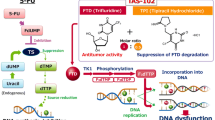Summary
Purpose: Phase II multicenter study investigated the efficacy and toxicity of the novel halogenated derivative of sulfaquixonaline Chloroquinoxaline Sulfonamide (CQS) in metastatic colorectal cancer. Experimental design: Eligible patients with metastatic or recurrent colorectal cancer received CQS at a dose schedule of 2000 mg/m2 over an hour weekly for 4 weeks every 42 days. Treatment was continued until unexpected toxicity or disease progression. Results: A total of seventeen patients were enrolled on this study. 94% of all patients enrolled had prior treatment. Sixteen patients were evaluable for response with fifteen patients showing evidence of disease progression and one patient with prolonged stable disease. One patient had non-evaluable disease. Following this interim analysis, the drug was considered ineffective and the study was terminated early. The most frequent adverse event was anemia. No patients discontinued the treatment because of toxicity. Conclusion: CQS, when given at a dose of 2000 mg/m2 weekly for 4 weeks every 42 days to patients with metastatic colorectal cancer, does not result in significant tumor regression.
Similar content being viewed by others
References
Jemal A, Murray T, Ward E, Samuels A, Tiwari RC, Ghafoor A, Feuer EJ, Thun MJ: Cancer statistics, 2005. CA Cancer J Clin 55(1):10–0, 2005
Pazdur R., Coia LR, Wagman LD, Ayoub JP: Colorectal and Anal Cancers. In: Cancer Management: A Mulitidisciplinary Approach. Third Edition. Ed. By Pazdur R, Coia L, Hoskins WJ,Wagman LD. PRRR, Huntington NY, 1999
Tong WP, Hartshorn J, Mathews LA: Chloroquinoxaline sulfonamide, investigational drug brochure. National Cancer Institute, Division of Cancer treatment, 1987
Branda RF, McCormack JJ, Perlmutter CA: Cellular pharmacology of chloroquinoxaline sulfonamide and a related compound in murine B16 melanoma cells. Biochem Pharmacol. 37(23):4557–564, 1988
Gao H, Yamasaki EF, Chan KK, Shen LL, Snapka RM: Chloroquinoxaline sulfonamide (NSC 339004) is a topoisomerase IIa/β poision. Cancer Res 60: 5937–940, 2000
Hickey R, Schiffer J, Wei Y, Malkas L: DNA synthesis is differentially affectd by the drugs mebarone and chloroquinoxaline. Proc Am Assoc Cancer Res 34:352, 1993
Branda RF, Moore AL, McCormack JJ: Immunosuppressive properties of chloroquinoxaline sulfonamide. Biochem Pharmacol 38: 3521–526, 1989
Rigas JR, Tong WP, Kris MG, Orazem JP, Young CW, Warrell RP Jr: Phase I clinical and pharmacological study of chloroquinoxaline sulfonamide. Cancer Res 52(23):6619–623, 1992
Conley BA, O’Hara S, Wu S, Melink TJ, Parnes H, Pardoe E, Egorin MJ, Van Echo DA: Phase I trial of chloroguinoxaline sulfonamide, with correlation of its pharmacokinetics and pharmacodynamics. Cancer Chemother Pharmacol 37(1–2):139–49, 1995
Rigas JR, Francis PA, Miller VA, Tong WP, Roistacher N, Kris MG, Orazem JP, Young CW, Warrell RP Jr: Clinical and pharmacology study of chloroquinoxaline sulfonamide given on a weekly schedule. Cancer Chemother Pharmacol 35(6):483–88, 1995
Therasse P, Arbuck SG, Eisenhauer EA, Wanders J, Kaplan RS, Rubinstein L, Verweij J, Van Glabbeke M, van Oosterom AT, Christian MC, Gwyther SG: New guidelines to evaluate the response to treatment in solid tumors. European Organization for Research and Treatment of Cancer, National Cancer Institute of the United States, National Cancer Institute of Canada. J Natl Cancer Inst. 92(3):205–16, 2000
Rothenberg ML, Oza AM, Bigelow RH, Berlin JD, Marshall JL, Ramanathan RK, Hart LL, Gupta S, Garay CA, Burger BG, Le Bail N, Haller DG: Superiority of oxaliplatin and fluorouracil-leucovorin compared with either therapy alone in patients with progressive colorectal cancer after irinotecan and fluorouracil-leucovorin: interim results of a phase III Trial. JCO 2059–069, 2003
Tournigand C, Andre T, Achille E, Lledo G, Flesh M, Mery-Mignard D, Quinaux E, Couteau C, Buyse M, Ganem G, Landi B, Colin P, Louvet C, de Gramont A: FOLFIRI followed by FOLFOX6 or the reverse sequence in advanced colorectal cancer: a randomized GERCOR study. J Clin Oncol 22(2):229–37, 2004
Kim R, Ohi Y, Inoue H, Toge T: Expression and relationship between topoisomerase I and II alpha genes in tumor and normal tissues in esophageal, gastric and colon cancers. Anticancer Res. 19(6B):5393–398, 1999
Author information
Authors and Affiliations
Rights and permissions
About this article
Cite this article
Bekaii-Saab, T.S., Mortazavi, A., Hicks, L.G. et al. A phase II study of chloroquinoxaline sulfonamide (CQS) in patients with metastatic colorectal carcinoma (MCRC). Invest New Drugs 24, 343–346 (2006). https://doi.org/10.1007/s10637-005-4827-3
Published:
Issue Date:
DOI: https://doi.org/10.1007/s10637-005-4827-3




